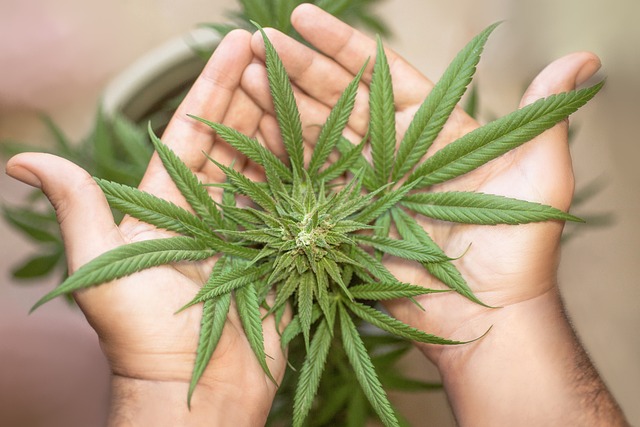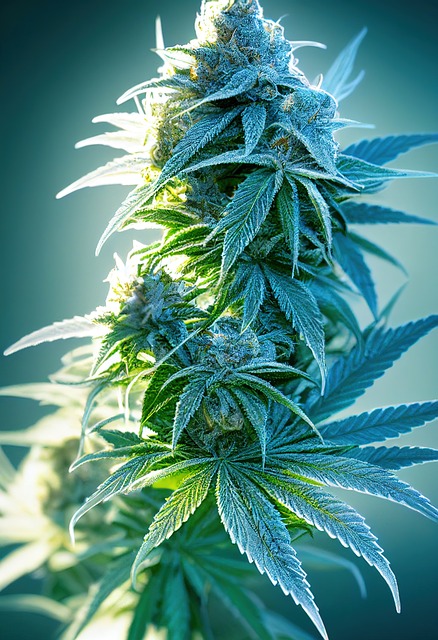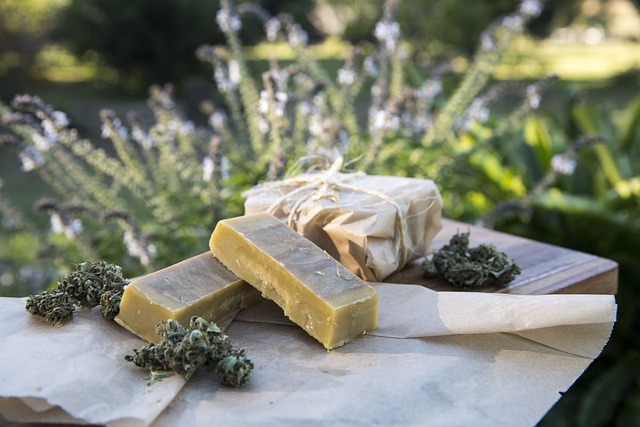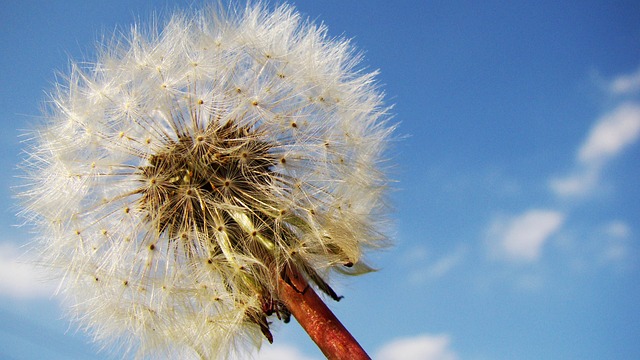Mississippi has legalized medical marijuana under the Mississippi Medical Marijuana Act, with a specific provision that allows for the use of THCA flower, a non-psychoactive component of cannabis known for its therapeutic potential. THCA is permissible as long as it adheres to state regulations and is purchased from licensed dispensaries, provided the THC content remains below 0.3% on a dry weight basis, in line with federal guidelines from the 2018 Farm Bill. THCA has been recognized for its health benefits, including anti-inflammatory and neuroprotective effects, which are being studied for broader medical applications. The state's policy towards THCA reflects a progressive stance in drug reform and healthcare. It is important for users to stay informed on the evolving legal landscape of cannabinoids like THCA, as well as to seek medical advice given its potential side effects such as dry mouth, red eyes, drowsiness, and fatigue. Users must also ensure they comply with all local regulations when accessing THCA flower in Mississippi. As research continues, so too may the legal status of THCA, potentially influencing national cannabis legislation discussions.
Delta-9 tetrahydrocannabinolic acid (THCA) flower, a non-psychoactive cannabinoid found in hemp and marijuana plants, has garnered attention for its potential wellness benefits. As legal frameworks evolve, including its status in Mississippi, understanding THCA’s effects and side effects becomes paramount for responsible use. This article delves into the science of THCA flower, its legal standing in Mississippi, and the nuances of its impact on health. It also provides a comprehensive look at potential side effects and strategies to manage them, ensuring users navigate this emerging landscape with informed clarity.
- Understanding THCA Flower: A Glimpse into Its Legal Status and Potential Impact in Mississippi
- The Science Behind THCA Flower: Effects, Benefits, and Considerations for Users
- THCA Flower Side Effects: What to Expect and How to Mitigate Them
- Navigating the Legal Landscape of THCA Flowers in Mississippi
- Best Practices for Using THCA Flower Responsibly in a Legal Context
Understanding THCA Flower: A Glimpse into Its Legal Status and Potential Impact in Mississippi

In recent times, the discussion surrounding cannabinoids has expanded significantly, with THCA flower—a form of raw cannabis that contains tetrahydrocannabinolic acid—gaining attention for its potential therapeutic properties and varying legal statuses across different states. In Mississippi, the legal landscape regarding THCA flower is distinct from that of its psychoactive counterpart, Delta-9 THC. As per the state’s regulations, THCA is currently legal within the bounds set by the Mississippi Medical Marijuana Act. This act permits the use of medical marijuana for qualifying patients, and THCA flower can be included as a permitted form if it meets the state’s specific criteria and is purchased from a licensed dispensary. Patients seeking to utilize THCA flower must possess a valid medical marijuana card and adhere strictly to the prescribed limitations.
The potential impact of THCA flower in Mississippi is multifaceted, touching upon both healthcare and public policy. Medically, THCA is often touted for its anti-inflammatory, neuroprotective, and potentially anti-cancer properties. However, it’s crucial to approach such claims with cautious optimism, as ongoing research continues to explore the full spectrum of effects that THCA may have on human health. From a public policy perspective, the integration of THCA flower into Mississippi’s medical cannabis program reflects an evolving approach to drug policy and healthcare. As the understanding of its effects becomes clearer through scientific inquiry and clinical trials, the legal status of THCA flower in Mississippi is likely to be revisited and may influence broader discussions on cannabis legislation nationwide. Users should always stay informed about local regulations and consult healthcare professionals before incorporating THCA flower into their wellness routine.
The Science Behind THCA Flower: Effects, Benefits, and Considerations for Users

Cannabidiolic acid (THCA) is a non-psychoactive compound found in the cannabis plant that has garnered attention for its potential therapeutic properties. As of my knowledge cutoff, THCA remains a subject of ongoing research, and its legal status varies by jurisdiction; notably in Mississippi, THCA flower is legal under certain conditions as part of the state’s medical cannabis program. The effects of THCA are distinct from those of its psychoactive counterpart, delta-9-tetrahydrocannabinol (THC). Users report that THCA may offer analgesic and anti-inflammatory benefits without the mind-altering effects associated with THC. This makes it a preferred option for individuals seeking relief from pain and inflammation without impairment.
The science behind THCA’s actions lies in its interaction with the body’s endocannabinoid system, where it may influence various physiological processes, including pain sensation, mood regulation, and immune response. Clinical studies have suggested that THCA may be beneficial for conditions such as neuropathic pain, inflammatory diseases, nausea, and wasting syndromes associated with cancer and HIV. However, it is crucial for users to approach the use of THCA flower with caution and to adhere to dosage guidelines provided by healthcare professionals or dispensary staff. Mississippi’s legal framework requires users to have a qualifying medical condition and a recommendation from a certified medical professional to legally purchase and use THCA flower. Users must also be mindful of potential side effects, which can include dry mouth, red eyes, drowsiness, and lethargy, particularly when transitioning between different cannabinoid products or dosages. Understanding the science behind THCA’s effects and maintaining clear communication with healthcare providers can help users navigate the therapeutic benefits of THCA while minimizing any adverse side effects.
THCA Flower Side Effects: What to Expect and How to Mitigate Them

THCA, or Tetrahydrocannabinolic Acid, is a non-psychoactive cannabinoid found in raw cannabis plants, which can decarboxylate into THC when heated. As interest in the potential wellness benefits of cannabinoids grows, understanding the effects of THCA, particularly its legality and side effects, becomes increasingly important for consumers. In Mississippi, where regulations vary, it’s crucial to be aware that THCA products may be legal under certain conditions, often depending on the THC content and how the product is marketed or used. Consumers considering THCA flower should be vigilant about the source and composition of the product to ensure they are in compliance with local laws.
When it comes to side effects, THCA is generally considered safer than its decarboxylated counterpart, THC. However, potential side effects can still occur and may include dizziness, lethargy, anxiety, and gastrointestinal discomfort. These effects are typically mild and transient, but individuals may experience varying degrees of sensitivity. To mitigate side effects, it is advisable to start with a low dose and gradually increase as needed, while also monitoring individual responses. Additionally, users should be mindful of their overall health condition and consult with a healthcare professional if they have concerns or a pre-existing condition that might interact with cannabinoids. Proper storage to preserve the acidic form of THC and careful dosing are key factors in minimizing any adverse effects associated with THCA flower use. Understanding the nuances of THCA legality and side effects is essential for safe consumption and compliance with state laws.
Navigating the Legal Landscape of THCA Flowers in Mississippi

Navigating the legal status of THCA flowers can be a complex task, especially for residents and visitors of Mississippi. As of the knowledge cutoff in early 2023, THCA, or tetrahydrocannabinolic acid, the raw form of CBD and THC found in cannabis plants, exists in a gray area within the state’s legal framework. While medical marijuana has been legalized for certain conditions under the Mississippi Medical Cannabis Act, the sale and possession of THCA flowers specifically are not explicitly addressed under this legislation. Therefore, while patients with qualifying conditions can legally access cannabis products that have been processed to remove or reduce psychoactive effects, such as CBD oils, THCA flowers fall into a less clearly defined legal space. It’s crucial for individuals considering the use of THCA flowers in Mississippi to stay informed about local laws and regulations, as interpretations of these can vary by jurisdiction. Users should be aware that possession and sale of cannabis-derived products can still lead to legal consequences if they violate state or federal laws, even within the medical marijuana program. Those interested in the therapeutic properties of THCA flowers should monitor legislative developments closely, as the legal landscape for such substances is subject to change with ongoing reform efforts.
Best Practices for Using THCA Flower Responsibly in a Legal Context

When incorporating THCA flower into one’s wellness routine, it is imperative to adhere to the legal framework governing its use, especially in states like Mississippi where its status has been clarified. As of the latest updates, THCA is considered a legal cannabinoid within Mississippi boundaries, provided it contains less than 0.3% delta-9-THC on a dry weight basis, aligning with federal regulations under the 2018 Farm Bill. Users in Mississippi should prioritize purchasing THCA flower from reputable sources that provide transparent lab reports confirming their products meet legal THC concentrations.
Responsible use of THCA flower begins with understanding the appropriate dosage for individual needs, as overconsumption can lead to unwanted side effects. It is advisable to start with a low dose and gradually increase it over time while closely monitoring effects. Additionally, storage conditions play a crucial role in maintaining the potency and efficacy of THCA flower. Keep the product in a cool, dry place away from direct sunlight and ensure it remains sealed until use to prevent degradation.
For those interested in the therapeutic properties of THCA, it’s important to consult with a healthcare professional before incorporating it into any health regimen. This step ensures that any potential benefits can be weighed against individual health considerations, and interactions with other medications are properly assessed. Always stay informed about the evolving legal landscape concerning cannabinoids to ensure compliance and safety.
In conclusion, THCA flower holds promising potential both medically and therapeutically within the confines of its legal framework in Mississippi. Users should be well-informed about its effects, benefits, and the associated side effects to use it responsibly and safely. As THCA flower becomes more regulated and understood under state law, adhering to best practices ensures a positive experience for individuals who find relief or enhancement of their quality of life through its use. For those considering incorporating THCA flower into their routine, understanding its legal status in Mississippi is paramount. It is advisable to consult with healthcare professionals and stay abreast of the evolving legal landscape to navigate this emerging field effectively. With careful consideration and responsible usage, THCA flower can be a valuable addition to one’s wellness regimen.
